

Dewey 1961
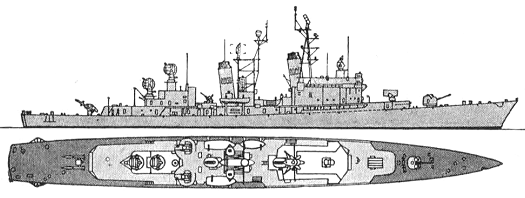
Coontz 1963
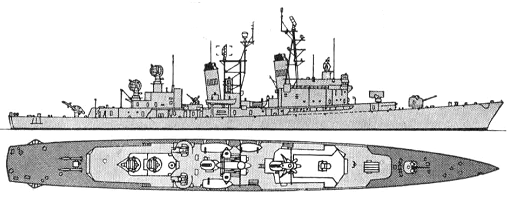
Coontz 1970
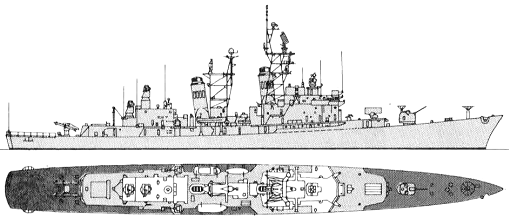
Coontz 1979
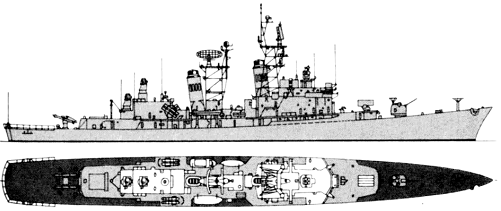
Coontz 1990
| No | Name | Yard No | Builder | Laid down | Launched | Comm | Fate |
| DLG6, 6.1975- DDG37 | Farragut | 1656 | Bethlehem, Quincy | 3.6.1957 | 15.7.1958 | 10.12.1960 | stricken 11.1992 |
| DLG7, 6.1975- DDG38 | Luce | 1657 | Bethlehem, Quincy | 1.10.1957 | 11.12.1958 | 20.5.1961 | stricken 11.1992 |
| DLG8, 6.1975- DDG39 | MacDonough | 1658 | Bethlehem, Quincy | 15.4.1958 | 9.7.1959 | 4.11.1961 | stricken 11.1992 |
| DLG9, 6.1975- DDG40 | Coontz | Puget Sound N Yd, Bremerton | 1.3.1957 | 6.12.1958 | 15.7.1960 | stricken 1.1990 | |
| DLG10, 6.1975- DDG41 | King | Puget Sound N Yd, Bremerton | 1.3.1957 | 6.12.1958 | 17.11.1960 | stricken 11.1992 | |
| DLG11, 6.1975- DDG42 | Mahan | Mare Island N Yd, San Francisco | 31.7.1957 | 7.10.1959 | 25.8.1960 | stricken 6.1993 | |
| DLG12, 6.1975- DDG43 | Dahlgren | Philadelphia N Yd | 1.3.1958 | 16.3.1960 | 8.4.1961 | stricken 11.1992 | |
| DLG13, 6.1975- DDG44 | William V. Pratt | Philadelphia N Yd | 1.3.1958 | 16.3.1960 | 4.11.1961 | stricken 11.1992 | |
| DLG14, 6.1975- DDG45 | Dewey | 333 | Bath Iron Wks | 10.8.1957 | 30.11.1958 | 7.12.1959 | stricken 11.1992 |
| DLG15, 6.1975- DDG46 | Preble | 334 | Bath Iron Wks | 16.12.1957 | 23.5.1959 | 9.5.1960 | stricken 11.1992 |
|
Displacement standard, t |
4167 |
|
Displacement full, t |
5648 |
|
Length, m |
149.4 wl 156.3 oa |
|
Breadth, m |
15.9 |
|
Draught, m |
5.30 |
|
No of shafts |
2 |
|
Machinery |
DLG6-8: 2 sets De Laval geared steam turbines, 4 Foster Wheeler boilers DLG9-14: 2 sets Allis Chalmers geared steam turbines, 4 Babcock & Wilcox boilers DLG15: 2 sets De Laval geared steam turbines, 4 Babcock & Wilcox boilers |
|
Power, h. p. |
85000 |
|
Max speed, kts |
32 |
|
Fuel, t |
oil 900 |
| Endurance, nm(kts) | 5000(20) |
|
Armament |
1 x 2 Terrier SAM (40 RIM-2), 1 x 8 ASROC ASuR (8 RUR-5), 1 x 1 - 127/54 Mk 42, 2 x 2 - 76/50 Mk 33, 2 x 3 - 324 Mk 32 TT (12) |
|
Electronic equipment |
DLG6, 14, 15: SPS-53, SPS-10B, SPS-29, SPS-37, 2x SPQ-5, SPG-53A, 2x Mk 35 radars, SQS-23 sonar, WLR-1, WLR-11, ULQ-6B ECM suites DLG7-13: SPS-53, SPS-10B, SPS-29, SPS-37, 2x SPG-55A, SPG-53A, 2x Mk 35 radars, SQS-23 sonar, WLR-1, WLR-11, ULQ-6B ECM suites |
|
Complement |
360 |
Project history: These were the first missile-armed fleet escorts designed and built as such, although the first three were originally to have been armed only with guns. They were designed on the recommendation of the Schindler Committee on the Long Range Shipbuilding Plan (1954), which argued for the construction of specialized Fast Task Force Escorts primarily for anti-aircraft screening, with submarine detection (for warning) but not destruction as an important secondary task. The resulting design called for four single rapid-fire 127mm/54s as well as two twin 76mm/50s; ASW weapons were limited to a single depth-charge track aft, a pair of fixed Hedgehogs (as in destroyers), and a quintuple torpedo tube intended primarily 'to embarrass enemy heavy units attempting to attack the carrier task force', as at Samar 1944.
Throughout the design, the installation of Terrier in place of the two after 127mm/54s was carried as an alternative, and in 1955 the Chief of Naval Operations, Admiral Carney, personally decided that half of the FY56 ships were to be built as missile frigates. His successor, Admiral Burke, decided to accelerate the introduction of missiles into the fleet by ordering all six FY56 ships as missile ships. Meanwhile development of new anti-surface ship torpedoes was abandoned, and the planned quintuple trainable tubes, which were not compatible with existing long-range anti-submarine torpedoes, were dropped from the project. At about the same time, however, the advent of Soviet nuclear submarines, which were capable of attacking even fast task forces, made ASW a more important function of fast fleet escorts. Thus these ships were redesigned, first for the rocket-assisted torpedo (RAT) and then for ASROC, which replaced one of the two forward 127mm/54s which had survived the transformation from all-gun to gun-and-missile frigates. At the same time their sonar was upgraded from the SQS-4 to the much larger SQS-23.
Modernizations: 1970-1977, all: - 1 x 2 Terrier SAM, 2 x 2 - 76/50, SPS-29, SPS-37, 2x SPG-55A or 2x SPQ-5A, 2x Mk 35 radars; + 1 x 2 Standard SM-1ER SAM (40 RIM-66), SPS-48C, SPS-49, 2x SPG-55B radars, NTDS CCS
1970, Farragut: ASROC stowage raised to 16 RUR-5 at all
1973-1974, King: + 2 x 6 - 20/76 Mk 15 Phalanx, 2x Mk 90 radars (temporarily for tests)
1973-1975, Coontz: + 2 x 6 - 20/76 Vulcan (temporarily for tests)
1977-1979, Farragut, Coontz, Dahlgren; 1980-1983, Luce, Macdonough, King, Mahan, William V. Pratt, Dewey, Preble: + 2 x 4 Harpoon SSM (8 RGM-84)
1982-1985, all: - SQS-23 sonar, WLR-1, WLR-11, ULQ-6B ECM suites; + 4 x 1 - 12.7/90, SPS-48C, SPS-49 radar, SQQ-23A PAIR sonar, SLQ-32(v)2 ECM suite, 4x Mk 36 SRBOC decoy RL
1983, Mahan: - 1 x 2 Standard SM-1ER SAM (40 RIM-66), SPS-48C, SPS-49 radars; + 1 x 2 Standard SM-2ER Block II SAM (40 RIM-67), SPS-48E, SPS-49(v)5 radars, SYS-2 IADT CCS
Naval service: No significant events.
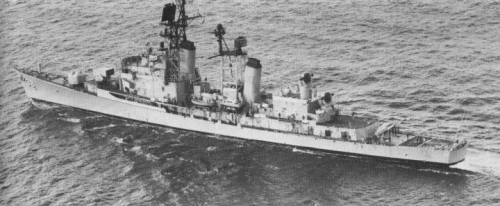
Luce 1979
© Ivan Gogin, 2015